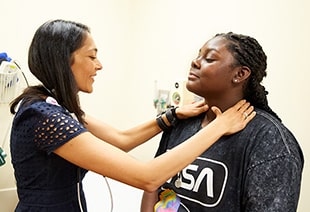Innovative Pre-Diabetes Clinic Aims to Prevent Type 2 Diabetes

A new Pre-Diabetes Clinic at Cincinnati Children’s is rapidly expanding. It serves children who have high hemoglobin A1C levels and are heading toward Type 2 diabetes.
“We built this, and boy did they come! This is one of the first centers in the country to focus on pre-diabetes as a condition,” says Nancy Crimmins, MD, pediatric endocrinologist at the clinic.
The clinic is seeing 25 patients a month, booked six months out and opening additional clinic days to accommodate demand.
“Our center was among the first to raise the alarm that Type 2 diabetes is a big deal with kids and that prevalence is increasing. We follow more than 150 children who have Type 2 diabetes, and this new clinic is a way to prevent the disease,” Crimmins says.
Two physicians, a nurse practitioner, dietitians and an exercise physiologist combine their expertise to address A1C levels of 5.7 to 6.4 and partner with the family to work on lifestyle factors that contribute to insulin resistance and high sugars.
More Than a Weight Management Clinic

Crimmins says about 10% of children with obesity also have pre-diabetes. While working in Cincinnati Children’s Healthworks weight management program, Crimmins recognized a sub-group of children who are advancing on the diabetes spectrum and need intervention.
The goal for the Pre-Diabetes Clinic is to see a child every three months until the child’s glucose status improves and better lifestyle habits are established. Each visit includes time with a physician, dietitian and exercise physiologist.
“We make a clinical treatment plan in which diet changes and exercise are the main prescription for treatment,” Crimmins says. “The entire family culture often changes. We look at barriers they have and consult social workers if they need help overcoming those barriers. We have resources we can tap into, like a food pantry with bags of frozen vegetables and other healthy foods.”
She says the clinic will study the phenotype of its patient population, and delve more deeply into understanding what happens on the spectrum from obesity to insulin dependence to Type 2 diabetes. Her team will be looking for ways besides lifestyle changes that can impact outcomes.
“We’ll create a registry that will help us improve care and treatments,” Crimmins says.
“This population deserves tailored and aggressive treatment to reverse the trend and prevent progression to diabetes. Our team has a passion for helping them,” Crimmins concludes.

